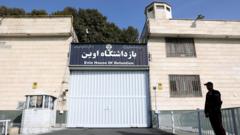As President Trump orders military strikes against Iran's nuclear capabilities, both Democratic and Republican lawmakers debate the constitutionality of his actions, weighing his powers under Articles I and II. Legal experts provide differing opinions, underscoring a complex history of presidential military engagement without congressional approval.
Legal Authority Behind Trump's Strikes: A Constitutional Conundrum

Legal Authority Behind Trump's Strikes: A Constitutional Conundrum
The legality of Donald Trump's military actions against Iran has sparked debate among lawmakers and experts regarding the president's authority.
In a recent turn of events, President Donald Trump’s decision to authorize strikes on multiple Iranian nuclear facilities has prompted a substantial legal debate within the U.S. Congress. Questions have emerged regarding the president's constitutional authority for such military actions, with dissent coming not only from Democrats but also from within his own Republican party. Congressman Thomas Massie publicly stated on social media that the strikes lacked constitutional basis, and fellow Republican Warren Davidson echoed that the justification for such actions is difficult to conceive as constitutional.
Conversely, House Speaker Mike Johnson asserted that Trump acted within his authority, believing the imminent threat posed by Iran warranted immediate military action without waiting for Congress, citing precedent for similar actions taken by past presidents from both parties. BBC Verify reached out to constitutional lawyers to clarify whether Trump's military response aligns with constitutional provisions or if Congress should have been consulted before such strikes took place.
The U.S. Constitution contains two key articles pertinent to this issue: Article I grants Congress the power to declare war, while Article II empowers the president to act as Commander in Chief. The White House has indicated that it relied on Article II, which has historically been interpreted to grant presidents the authority to engage militarily under specific circumstances, such as preventing imminent threats or advancing national interests – a rationale the Trump administration employs in justifying its actions regarding Iran.
Several experts have weighed in on the legality of Trump's strike, with notable constitutional scholar Claire Finkelstein affirming that the president had the authority to carry out these actions based on historical precedent. On the other hand, Andrew Rudalevige from Bowdoin College expressed skepticism, suggesting that the absence of an immediate attack to repel puts Trump’s actions outside the scope of his authority.
While Article I's war declaration power has seldom been invoked—most recently in 1942—presidents have become increasingly inclined to pursue military actions independently. Legal adviser John Bellinger noted that Congress has often acquiesced to presidential military maneuvers without objection, effectively diminishing the need for formal declarations of war.
Historical precedent shows that many past presidents, including Barack Obama and Bill Clinton, have conducted military actions without congressional approval, supporting the notion that Trump's approach is not unprecedented. Critics of Trump, however, have pointed to the War Powers Resolution of 1973, which mandates that the president consult Congress before engaging the military in hostilities, emphasizing that Trump allegedly did not follow this protocol. Following the airstrikes, Defense Secretary Pete Hegseth claimed Congress was promptly notified afterward, invoking stipulations of the War Powers Act.
The ongoing debate encapsulates the complexities of executive military authority and the relationship between Congress and the presidency, raising essential questions about the checks and balances that govern U.S. military actions in the contemporary geopolitical landscape.





















